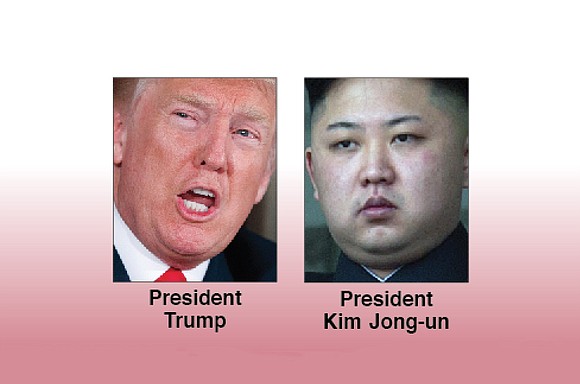Tensions high over North Korea
Free Press staff, wire reports | 8/11/2017, 11:10 a.m.
WASHINGTON
Are we facing a nuclear war with North Korea?
Amid all the issues people are facing in Richmond and elsewhere, President Trump pushed that question front and center this week.
In an out-of-the-blue threat Tuesday, he said the nation would respond with “fire and fury and, frankly, power the likes of which this world has never seen before” if North Korea persists in threatening the United States.
He sounded ready to push the button, and follow-up remarks from members of his administration did little to ease the tension he created. That includes a comment from U.S. Defense Secretary James Mattis that North Korea must stop any action that would “lead to the end of its regime and the destruction of its people.”
Seemingly unimpressed, North Korea’s supreme leader Kim Jong-un and military came back the same day with a threat to teach America a “severe lesson,” and sent word through the state news agency that plans are being dusted off for missile strikes against U.S. military bases on the Pacific island territory of Guam.
At the moment, the exchange is being called a war of words that will not change the status quo of a threatening North Korea and a concerned world, a situation that has existed since North Korea first exploded a nuclear weapon in 2006.
By Wednesday, President Trump appeared to back off a little, expressing hope the U.S. nuclear arsenal would never have be used.
Still his initial comment jangled the nerves of allies, particularly South Korea and Japan, which would be most affected if nuclear war happened as they sit on North Korea’s doorstep.
The president also risked alienating adversaries China and Russia, who are viewed as most able to pressure Mr. Kim to abandon his pursuit of a robust nuclear arsenal capable of striking the continental United States.
Despite his latest attempt to temper his words, President Trump is seen by a number of analysts as having moved the nation closer to nuclear war than at any time since the Cuban missile crisis of 1962. At that time, the U.S. and Russia faced off over the placement of nuclear missiles 90 miles from the U.S. coast.
Although at least nine nations have nuclear weapons, the only time nuclear bombs have been used was during World War II, when the United States bombed two Japanese cities, incinerating about 200,000 people in Hiroshima and Nagasaki and forcing Japan’s surrender.
Among those distressed by the president’s inflammatory words is U.S. Sen. Mark Warner, a Virginia Democrat who is vice chair of the Senate Select Committee on Intelligence.
While acknowledging that North Korea is dangerous, Sen. Warner is among those who see the president as senselessly pouring verbal gasoline on a situation fraught with sufficient peril at a time when America has no credible plan for dealing with North Korea.
“President Trump’s inflammatory rhetoric undermines our global credibility and is unlikely to de-escalate the situation,” he said in a statement Wednesday.
“We need fewer fiery words and bombastic tweets from the president and his cable TV surrogates and more effort to work with our international partners to expand missile defenses and deterrence and create a strategy to roll back North Korea’s nuclear and ballistic missile programs.”
Sen. Warner noted that key positions in the State Department remain vacant at a time when the Trump administration needs expert help to think through the options and prepare a realistic response to the North Korean threat.
“Improvising our way into a shooting war on the Korean peninsula without a plan puts us all at risk,” he concluded.
North Korea’s nuclear weapons development has been a focus for the past four presidents, and particularly in the 11 years since its first weapons test. North Korea’s threat has ratcheted up since President Trump took office in January.
Last month, North Korea successfully tested a long-range missile that could reach cities in the United States. That was followed by the release of photos showing North Korea had a miniature nuclear weapon that could fit in a missile head.
The United Nations has reacted by approving new sanctions against North Korea that passed muster with Russia and China, which is North Korea’s major trading partner. The sanctions angered North Korea, though China’s enforcement remains a question.







